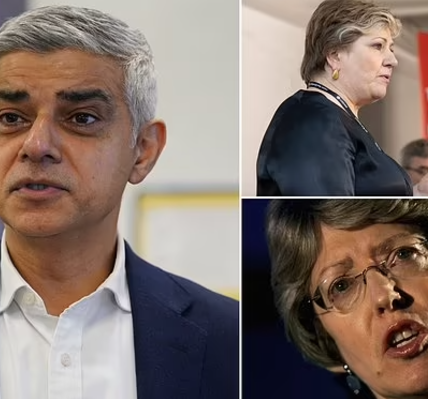Rachel Reeves is accused of killing growth as Bank of England warns UK economy is grinding to halt after her anti-business Budget_Nhy
Rachel Reeves was yesterday accused of killing growth as the Bank of England warned the economy is grinding to halt in the wake of her anti-business Budget.
Before Labour took office Britain’s economy was the fastest-growing in the G7 – and was described as going ‘gangbusters’ by the Office for National Statistics. But now it faces a period of stagnation.
But in a new forecast, the Bank downgraded its UK growth outlook for the last three months of this year to zero, from a previous prediction of 0.3 per cent.
It is the latest evidence that the Chancellor’s £25bn National Insurance hike is crushing business and leaving Labour’s pre-election promise to prioritise the economy in tatters.
Shadow business secretary Andrew Griffith said: ‘Today’s growth downgrade from the Bank of England follows warnings from almost every business group and forecaster.
‘Rachel Reeves has no feel for how to run an economy, instead she has already killed jobs, investment and growth on her watch.’
Sir Keir Starmer last night appealed to the public to be patient on Labour’s promise to turn round the economy.
The Prime Minister told MPs it ‘will take some time’ for people to feel the benefit of the Budget and other measures brought in by the new government.

Rachel Reeves was yesterday accused of killing growth as the Bank of England warned the economy is grinding to halt

Andrew Sentance, a former Bank of England economist, said: ‘Higher inflation, higher pay increases, and a damaging Budget which has yet to fully affect the economy. Not a surprise that the financial markets are pushing up UK bond yields’
Paul Dales, chief UK economist at consultancy Capital Economics, said: ‘The forecast gives more credence to the idea that the economy is flirting with recession’And shadow chancellor Mel Stride warned it may mean Ms Reeves will have to break her pledge not to come back for more tax hikes to finance her spending plans.
There are also fears that even as growth stagnates, inflation could climb – creating a worrying 1970s-style ‘stagflation’ scenario.
Worries about inflation – already at an eight-month high – prompted the Bank’s nine-member Monetary Policy Committee (MPC) to leave interest rates on hold at 4.75 per cent yesterday.
It was a blow to millions of borrowers who might have hoped that rates would be falling more sharply by now.
Bank of England governor Andrew Bailey said: ‘We think a gradual approach to future interest rate cuts remains right, but with the heightened uncertainty in the economy we can’t commit to when or by how much we will cut rates in the coming year.’
Anna Leach, chief economist at the Institute of Directors, said: ‘There is little doubt… that they see a link between the Budget and markedly weaker confidence and activity in the private sector.’
Official figures show that growth had already stalled in the run-up to the Budget – with gross domestic product (GDP) shrinking by 0.1 per cent in October.
Business surveys since then suggest that activity levels have worsened still further, prompting claims that the UK is now on ‘recession watch’.
A recession is defined as two successive quarters of economic contraction. If GDP shrinks in the fourth quarter of this year and again at the start of 2025 it will be in recession.

People walk past the Bank of England building before the announcement of the central bank’s interest rate decision, London, UK, 19 December 2024

Britain’s central Bank, is pictured in London on December 19, 2024
The Chancellor’s decision to hike NI contributions for employers has been widely blamed.
Ms Reeves increased the rate from 13.8 per cent to 15 per cent and lowered the threshold for paying it from £9,100 to £5,000.
The Bank of England said its downgrade for fourth quarter growth reflected ‘the latest combined steer from business surveys and the latest available data’.
A separate survey of business conditions published by the Bank alongside the rates decision found that employers were caught on the hop by the ‘largely unanticipated’ NI hike.
‘Many firms will consider reductions in headcount, hours and pay settlements to mitigate the impact on their labour costs,’ it said.
The survey found it would have a ‘particularly significant impact on those employing relatively high proportions of part-time or low-paid workers’.
It also reported evidence that families were continuing to face cost of living pressures including those on middle incomes, with a growing number relying on food banks and a ‘common view’ that a ‘higher cost of living and lower living standards’ was becoming the ‘ongoing norm’.
Many households said the suggestion that the economy had ‘stabilised’ – as the Prime Minister this week claimed – was ‘at odds with their experience’.
Yesterday, Liam Byrne, Labour chairman of the Commons business and trade committee, told the Prime Minister that firms were ‘going to be cutting investment, wages and workforce next year’, following a triple whammy of tax hikes, new employment rights and a higher minimum wage.
Mr Byrne said businesses were ‘asking to see a plan for growth and they are struggling to see that right now’.

A video grab from footage broadcast by the UK Parliament’s Parliamentary Recording Unit (PRU) shows Britain’s Prime Minister Keir Starmer attending a Parliamentary Liaison Committee hearing in London on December 19, 2024

Liam Byrne during his speech to the Fabian Society conference in central London. Picture date: Saturday January 20, 2024

Shadow chancellor Mel Stride said: ‘Without the growth Labour promised, they will be unable to sustain their spending plans and will be under real pressure to break the Chancellor’s pledge that she will not be back with more tax hikes’
Sir Keir acknowledged that current growth forecasts are disappointing but said it was because they are ‘not able to take into account things that have not happened’, such as Labour’s promised planning reforms.
Asked about growth, he said: ‘It will take some time, of course it will. One of the biggest mistakes, I think, in the last 14 years was the idea that everything could be fixed by Christmas. It can’t.
‘The planning will take time. The change in regulation will take time, we’ve got a national wealth fund which is investing, getting record investment into the country, that will take time.’
The PM insisted that he stood by Labour’s pre-election promise to achieve the highest growth in the G7 by the end of this parliament, despite current forecasts suggesting the UK is likely to end the decade in mid table.
The Bank has been left in a dilemma over how to respond to Labour’s NI hike because of ‘significant uncertainty’ about what it will mean for inflation.
If businesses pass on the costs in the form of higher prices that will stoke inflation. But lower wages for staff and fewer jobs would tend to bring inflation down.
The Bank’s main task is to bring inflation down to its 2 per cent target.Figures this week showed it has climbed to an eight-month high of 2.6pc while wage growth rose unexpectedly to 5.2pc, adding to price pressures.
UK government borrowing costs rose as yields on ten-year bonds, known as gilts, traded at their highest level for more than a year.
Rupert Harrison, who was an advisor to Tory Chancellor George Osborne, said: ‘For businesses and households this has very real consequences in higher mortgage rates and interest payments.
Coming on top of higher taxes it’s no wonder economic confidence has plunged. The UK is in a bad way.’
Former Bank of England rate-setter Andrew Sentance said: ‘Higher inflation, higher pay increases, and a damaging Budget which has yet to fully affect the economy. Not a surprise that the financial markets are pushing up UK bond yields.’
Shadow chancellor Mr Stride said: ‘Without the growth Labour promised, they will be unable to sustain their spending plans and will be under real pressure to break the Chancellor’s pledge that she will not be back with more tax hikes.
‘At the end of the day, it is once again working people that will pay have the price for Labour’s economic mismanagement.’



